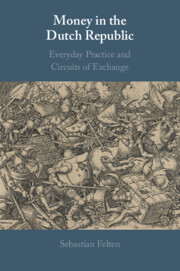Book contents
- Money in the Dutch Republic
- Money in the Dutch Republic
- Copyright page
- Dedication
- Contents
- Figures
- Tables
- Acknowledgements
- Introduction
- 1 Money as Social Technology
- 2 Grain Money in a Farming Community
- 3 Ink Money in a Princely Estate
- 4 Metallurgy and the Making of Intrinsic Value
- 5 Mercantile Practice and Everyday Use
- 6 Patriotic Economics and the Making of a National Currency
- Conclusion
- Appendix
- Archival Sources
- References
- Index
Conclusion
Published online by Cambridge University Press: 03 March 2022
- Money in the Dutch Republic
- Money in the Dutch Republic
- Copyright page
- Dedication
- Contents
- Figures
- Tables
- Acknowledgements
- Introduction
- 1 Money as Social Technology
- 2 Grain Money in a Farming Community
- 3 Ink Money in a Princely Estate
- 4 Metallurgy and the Making of Intrinsic Value
- 5 Mercantile Practice and Everyday Use
- 6 Patriotic Economics and the Making of a National Currency
- Conclusion
- Appendix
- Archival Sources
- References
- Index
Summary
What did early modern money look like when ‘viewed from the inside’? The merchants, assayers, stewards of manors, church wardens, and farmers studied in this book knew that some coins and paper monies had a wide reach, but they were also aware that people living in nearby regions, towns, and villages had preferences as to how they would like to be paid. Many people were good at assessing the quality of objects, recognising objects as currency, and converting one currency into another, because this was fundamental for getting on with their lives. In urban centres, officials, assayers, and masters of the mint were highly skilled at making and testing coins, but once they had released their coins into circulation, they had to enlist a wide range of people, including lowly clerks and bargemen, to uphold the standard of the realm. Juggling units, coins, and goods was the livelihood of merchants and stewards, but farmers and country priests needed this skill, too, as they tended to their farms and flocks. All seemed able to connect the dots between one currency and another, and some constructed networks of currencies, on paper and presumably in their minds, too. Travelling along this network, a bushel of rye in Bredevoort could become a bale of silk in Batavia, with measured silver serving as a middle term. Small acts of scrutiny underpinned the great movements of silver, gold, and other money objects around the globe. Far-flung circuits of exchange emerged from everyday practices at the level of individual transactions.
- Type
- Chapter
- Information
- Money in the Dutch RepublicEveryday Practice and Circuits of Exchange, pp. 207 - 214Publisher: Cambridge University PressPrint publication year: 2022



